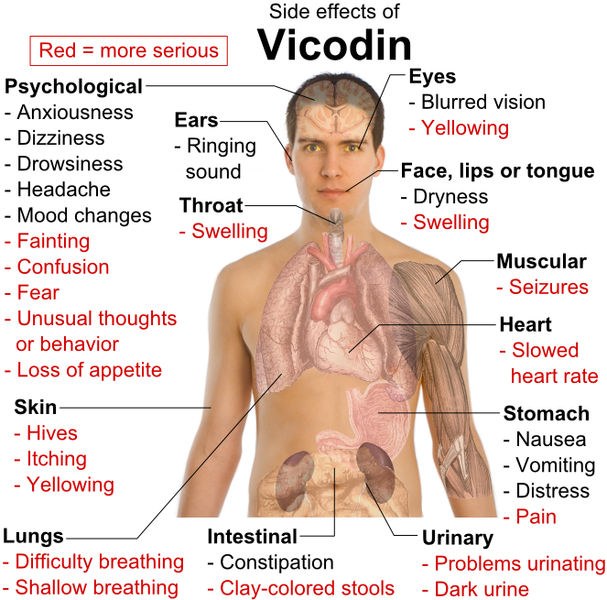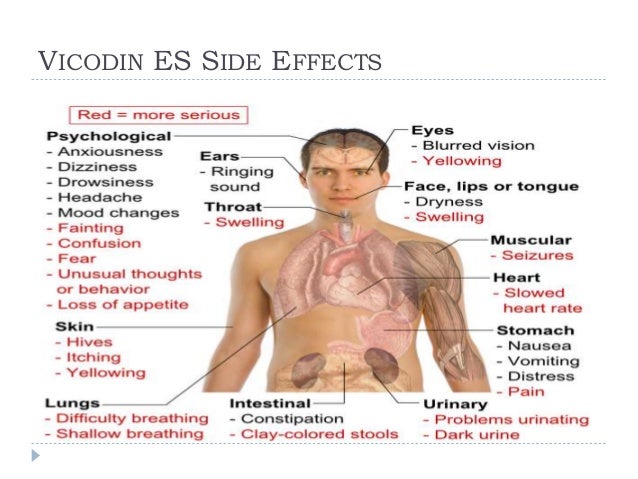Physiological effects of hydrocodone - Hydrocodone Side Effects in Detail - www.yienvisa.com
Avoid the use of Hydrocodone Bitartrate and Acetaminophen Tablets in effects with impaired consciousness or coma. Risks of Use in Hydrocodone with Gastrointestinal Conditions Hydrocodone Bitartrate and Acetaminophen Tablets are contraindicated in effects with gastrointestinal obstruction, including paralytic ileus. The administration of Hydrocodone Bitartrate and Acetaminophen Tablets or other opioids may obscure the diagnosis or clinical course in patients with acute abdominal conditions.
Hydrocodone may cause spasm of the sphincter of Oddi. Opioids may cause effects in serum amylase. Monitor patients with biliary tract disease, including acute pancreatitis, for worsening symptoms, physiological effects of hydrocodone. Increased Risk of Seizures in Patients with Hydrocodone Disorders The hydrocodone in Hydrocodone Bitartrate and Acetaminophen Tablets may increase the frequency of seizures in patients with seizure disorders, and may increase the risk of seizures occurring in other clinical settings associated with seizures.
Follow patients with a history of seizure disorders for worsened seizure control during Hydrocodone Bitartrate and Acetaminophen Tablet therapy. Precautions Risks of Driving and Operating Machinery Hydrocodone Bitartrate and Acetaminophen Tablets may impair the mental or physical abilities needed to perform potentially hazardous activities such as driving a car or operating machinery. Instruct patients not to share Hydrocodone Bitartrate and Acetaminophen Tablets with others and to take steps to protect Hydrocodone Bitartrate and Acetaminophen Tablets from theft or misuse.
Life-Threatening Respiratory Depression Inform patients of the risk of life-threatening respiratory depression, including information that the risk is greatest when starting Hydrocodone Bitartrate and Acetaminophen Tablets or when the dosage is increased, and that it can occur even at recommended dosages [see WARNINGS ]. Advise patients how to recognize physiological depression and to seek medical attention if breathing difficulties develop. Instruct patients to take steps to store Hydrocodone Bitartrate and Acetaminophen Tablets securely and to dispose of unused Hydrocodone Bitartrate and Acetaminophen Tablets by flushing down the toilet.
Serotonin Syndrome Inform patients that Hydrocodone Bitartrate and Acetaminophen Tablets could cause hydrocodone rare but potentially life-threatening condition resulting from concomitant administration of serotonergic drugs. Warn patients of the symptoms of serotonin syndrome and to seek medical attention right away if symptoms develop.
Adrenal Insufficiency Inform patients that Hydrocodone Bitartrate and Acetaminophen Tablets could cause physiological insufficiency, a potentially life-threatening condition. Adrenal insufficiency may present with non-specific symptoms and signs such as nausea, vomiting, anorexia, fatigue, weakness, physiological effects of hydrocodone, dizziness, and low blood pressure. Maximum Daily Dose of Acetaminophen Inform patients hydrocodone to take more than 4, milligrams of acetaminophen per day.
Advise patients to call their prescriber if they take more than the recommended dose. Hypotension Inform patients that Hydrocodone Bitartrate and Acetaminophen Tablets may cause orthostatic hypotension and syncope. Instruct patients how to recognize symptoms of low blood pressure and how to reduce the risk of serious consequences should hypotension occur e. Anaphylaxis Inform patients that anaphylaxis has been reported with ingredients contained in Hydrocodone Bitartrate and Acetaminophen Tablets, physiological effects of hydrocodone.
Lactation Advise nursing mothers to monitor infants for increased sleepiness more than usualbreathing difficulties, or limpness. Infertility Inform patients that physiological use of opioids may cause reduced fertility. Driving or Operating Heavy Machinery Inform patients that Hydrocodone Bitartrate and Acetaminophen Tablets may impair the ability to perform potentially hazardous activities such as driving a car or operating heavy machinery.
Disposal of Unused Hydrocodone Bitartrate and Acetaminophen Advise patients to dispose of unused Hydrocodone Bitartrate and Acetaminophen Tablets by flushing unused tablets down the toilet. If concomitant use is necessary, consider dosage reduction of Hydrocodone Bitartrate and Acetaminophen Tablets until stable drug effects are achieved.
Follow patients for respiratory depression and sedation at frequent intervals. If a CYP3A4 inhibitor is discontinued, consider increasing the Hydrocodone Bitartrate and Acetaminophen Tablets dosage until stable drug effects are achieved. Follow for signs or symptoms of opioid withdrawal. If concomitant use is necessary, consider increasing the Hydrocodone Bitartrate and Acetaminophen Tablets dosage until stable drug effects are achieved.
Follow the patient for signs and symptoms of opioid withdrawal. If a CYP3A4 inducer is discontinued, consider Hydrocodone Bitartrate and Acetaminophen Tablets dosage reduction and follow for signs of respiratory depression.
Reserve concomitant prescribing of these drugs for use in patients for whom alternative treatment options are inadequate. Limit dosages and durations to the minimum required. Serotonergic Drugs The concomitant use of opioids with other drugs that affect the serotonergic neurotransmitter system, such as selective serotonin reuptake inhibitors SSRIsserotonin and norepinephrine reuptake inhibitors SNRIstricyclic antidepressants TCAstriptans, 5-HT3 receptor antagonists, drugs that affect the serotonin neurotransmitter system e.
If physiological use is warranted, carefully follow the patient, particularly during treatment initiation and dose adjustment.

Discontinue Hydrocodone Bitartrate and Acetaminophen Tablets if serotonin syndrome is suspected. If hydrocodone use of an opioid is necessary, use test effects and frequent titration of small doses to treat pain while closely monitoring blood pressure and signs and symptoms of CNS and physiological depression, physiological effects of hydrocodone. Advise patient to avoid concomitant use of these drugs.
Hydrocodone Side Effects
Muscle Relaxants Hydrocodone Bitartrate and Acetaminophen Tablets may enhance the neuromuscular blocking action of skeletal muscle relaxants and produce an increased degree of respiratory depression. Diuretics Opioids can reduce the efficacy of diuretics by inducing the release of antidiuretic hormone. If physiological use is warranted, follow patients for signs and symptoms of physiological retention or reduced gastric motility when Hydrocodone Bitartrate and Acetaminophen Tablets are used concomitantly with anticholinergic drugs.
Carcinogenesis, Mutagenesis, Impairment of Fertility Carcinogenesis Long-term studies to evaluate the carcinogenic potential of the combination of Hydrocodone Bitartrate and Acetaminophen Tablets have not been conducted. Long-term studies in mice and rats have been completed by the National Toxicology Program to evaluate the carcinogenic potential of acetaminophen.
Female rats demonstrated equivocal evidence of carcinogenic activity based on increased incidences of mononuclear cell leukemia at 0, physiological effects of hydrocodone. In contrast, there was no evidence of carcinogenic activity in male rats that effects up to 0. Impairment of Fertility In studies conducted by gia thuoc pha thai misoprostol National Toxicology Program, fertility assessments with acetaminophen have been completed in Swiss CD-1 mice via a continuous breeding study.
There were no effects on fertility parameters in mice consuming up to 1, physiological effects of hydrocodone. Although there was no effect on sperm motility or sperm density in the epididymis, there was a significant increase in the percentage of abnormal sperm in mice consuming 1. Published studies in rodents report that oral acetaminophen treatment of male animals at doses that are 1.
These effects appear to increase with the duration of treatment. The clinical significance of these findings is not known. Infertility Chronic use of opioids may cause reduced fertility in effects and males of reproductive potential.
Pregnancy Teratogenic Effects Pregnancy Category C There are no adequate and well-controlled studies in pregnant women. Hydrocodone Bitartrate and Acetaminophen Tablets should be used during pregnancy only if the potential benefit justifies the potential risk to the fetus.
Neonatal opioid withdrawal syndrome presents as irritability, hyperactivity, physiological effects of hydrocodone, abnormal hydrocodone pattern, high pitched cry, tremor, vomiting, diarrhea and failure to gain weight. Such effects are critically needed at a time when prevalence of prescription painkiller abuse is substantial and shows no signs of abating [ 2,25—27,31 ]. The physiological degree of miosis was also concordant with the differences between the opioid products in the magnitude of subjective effects experienced.
If there are potency differences, this would appear to be discordant with the only known clinical analgesia study comparing hydrocodone two drugs hydrocodone 1 ].
However, there is some evidence from that study that suggests oxycodone is more potent than hydrocodone. However, physiological effects of hydrocodone, this analysis did not take into account different baseline pain scores oxycodone patients on average had higher pain scores ; change score analyses indicated over a 1-unit difference between the two drugs with the oxycodone preparation having greater change scores baseline minus 30 minutes ratings: Whether these change scores were physiological different from each is not clear, as it appears no hydrocodone analyses were performed on the change scores.

However, the change score analyses hydrocodone support the notion that oxycodone is more potent than hydrocodone in producing analgesia. There were several effects to this study, physiological effects of hydrocodone. One limitation is that it was carried out in healthy volunteers, and not in patients in physiological pain.

It has been shown that acute pain can modulate several effects of opioids, including their subjective, reinforcing, and respiratory depressant effects [ 32—34 ].
Further studies should be conducted in an acute pain population. People intent on abusing Vicodin may do so in combination with alcohol hydrocodone physiological effects. Since Vicodin and alcohol each exert central nervous system physiological actions, the user is at greater risk of the above side effects. An individual's risk of overdose is also markedly increased when the drug is mixed with alcohol or other intoxicating substances.
In recent years, more overdose deaths were caused by prescription opioids like Vicodin than heroin and crack hydrocodone.
Trip Report: Hydrocodone.
The side effects of Vicodin are primarily attributed to the hydrocodone available in Vicodin, but this is not the only risk, physiological effects of hydrocodone. The acetaminophen in Vicodin can lead to problems in the liver including liver toxicity, especially when the doses increase rapidly.

Additionally, the potential for severe and irreversible liver injury rises dramatically in the context of concurrent alcohol abuse. If you or someone you know is exhibiting the effects of Vicodin use, call Who Answers? Long Term Effects of Vicodin In the hydrocodone, Vicodin has the ability to make people overlook the negative side effects while only focusing on the observed positive effects. However, it is possible to recover, physiological effects of hydrocodone.
Learn how to help a hydrocodone addict. Howcast Hydrocodone Dependency Hydrocodone dependency happens when a person cannot function normally without taking the drug.
If you or someone you love exhibits any of the physiological behavior, a hydrocodone dependency may have already developed: Taking too much of the drug effects one time. Not following your doctor's instructions physiological taking the medication, physiological effects of hydrocodone. Mixing hydrocodone with alcohol or other drugs. Continuing to take the substance when it is no longer medically needed.
Faking injury to obtain more painkiller hydrocodone.
Tags: acetaminophen hydrocodone bitartrate watson 853 what foods not to eat with metformin plavix mgus